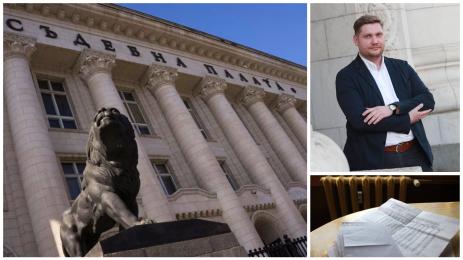Tuesday: in the morning – half an hour of airtime on bTV, in the afternoon – 25 minutes on the Bulgarian National Radio, and that same night – one hour on the programme of Sasho Dikov. This is followed by 30 minutes on Bulgaria ON AIR on Wednesday morning. No, this is not the busy schedule of a rock star or some genius inventor. Neither is it the schedule of the country’s president, who surely would have something important to say to the nation.
Tuesday: in the morning – half an hour of airtime on bTV, in the afternoon – 25 minutes on the Bulgarian National Radio, and that same night – one hour on the programme of Sasho Dikov. This is followed by 30 minutes on Bulgaria ON AIR on Wednesday morning. No, this is not the busy schedule of a rock star or some genius inventor. Neither is it the schedule of the country’s president, who surely would have something important to say to the nation.
It is the media life of Emiliyan Gebrev – a former State Security agent, employee of the state-owned Kinteks, and representative of the communist-era offshore company Scirrio Bulgaria, which traded, at the instruction of the late PM Andrei Lukanov and Ognyan Doynov, with Captagon and other embargo goods. After 1989, wielding the millions laundered through Scirrio Bulgaria, Gebrev, the former State Security agent, became a big-time arms dealer.
Then came waves of scandals and shady arms deals for deliveries to the Middle East, Africa and Latin America. Gebrev was a communist in the past and yet he and Boyko Noev, defence minister in the cabinet of Ivan Kostov, are thick as thieves and the latter protects Gebrev with all he has these days. It is not that strange, actually. The two share common roots – former communists, who worked for the totalitarian intelligence services. In 2001 it was Boyko Noev, in his capacity as defence minister, who restored Gebrev’s licence, revoked after the US customs authorities seized an arms delivery bound for Nicaragua. These days, Boyko Noev has added another role to his repertoire – that of a consultant on conspiracy theories. Until 2014, he was also an employee of Tsvetan Vassilev (working at Vassilev’s flagship company Bromak, a shareholder in the collapsed CorpBank). In short, this is what the life of the tandem of Emiliyan Gebrev and Boyko Noev looks like. There are many interesting details, but this is not the place or the time to share them. That moment will come too. Today, the duo is in the spotlight, basking in attention because of their theory about Gebrev’s attempted poisoning with Novichok. This development suits the typical style of former State Security agents, even though the saga is unfolding by the rules of hybrid warfare, in this case conducted against every person that stands in the way of Vassilev and Gebrev, which naturally includes our publisher, MP Delyan Peevski.
During the murky transition to democracy, Emiliyan Gebrev took the arms sector, Ognyan Donev – drugs, Sasho Donchev – natural gas distribution. All three had the same start and method of acquiring their first million. The only difference is the exact piece of the pie they got, on the back of which they have been accumulating wealth for the past 30 years.
Nowadays, Gebrev has the distinguished grey look of an older gentleman, presents himself as a self-made, “honest” businessman with a “good name” that he spent decades establishing; he speaks with gravity in studios, it is almost enough to bring tears to your eyes and make you believe him. He was supposedly given poison because of his interest in and desire to save Dunarit. He points a finger, insinuates, manipulates. He blames the state, some offshore company that is presumably challenging him in court in a bid to prevent him from taking complete control of the military plant. He demands that PM Boyko Borissov solves his problem. Because he, Gebrev, you see, is like Sergei Skripal – so important that he was attacked with Novichok. He is so important in his role as a victim that everyone has to bow to his wishes, even the state.
In 2015, another prominent fraudster of Bulgaria’s transition to democracy, Tsvetan Vassilev, decided to gift the Russians the Bulgarian Telecommunications Company, Dunarit, Avionams, NURTS and First Digital in exchange for just €1, even though they have a combined value of over €1bn. On 24 March 2015, at a press conference in Sofia the Belgian citizen with Russian passport Pierre Louvrier announced that his company LIC 33 had acquired these assets from Vassilev. In February Louvrier had been registered as a director of the company Kemira, which owns 99.5% of Dunarit’s shares, as well as a proxy for the military plant itself.
It was not until early 2016, at which point Tsvetan Vassilev’s deals with Pierre Louvrier and the Russian Dmitry Kosarev (who also proclaimed to own the above-mentioned assets of CorpBank) had fallen through, that Vassilev was forced to look for another figure to lay claim on Dunarit’s ownership. It was a figure with a background in arms trade. That is how the latest attempt to “legalise” the theft of Dunarit started and it features Emiliyan Gebrev alongside Vassilev.
Presently, the Dunarit corporate group owes about BGN 200m to the failed CorpBank. At the beginning of 2016, the lender’s bankruptcy administrators filed lawsuits against the debtors, the main one being against Hedge Investment Bulgaria, which is the sole owner of Kemira and owes CorpBank nearly €53m. The administrators have asked for Kemira to be closed, which would make the assets of the company – 99.5% of Dunarit’s shares – subject to realisation. That is what prompted the Vassilev-Gebrev duo to take action to prevent the administrators from carrying out the distraint on the military plant’s shares. Furthermore, in 2016, at the request of the Commission for Illegal Assets Forfeiture (CIAF), the court distrained Kemira’s shares in Dunarit. Apparently, Tsvetan Vassilev really felt the heat from where he was holed up in a luxury hotel in Belgrade because he and Gebrev rolled up their sleeves and got down to work. With the help of their figureheads in Dunarit and the companies owning it, Kemira and Hedge Investment Bulgaria – figureheads like Nikola Kirov, Krastyo Krastev, Asen Babanski, Ivan Ezerski, and a multitude of attorneys – the Vassilev-Gebrev tandem first increased the capital of the parent company Kemira in order to reduce to the negligible 10% the stake of CorpBank debtor and hitherto sole owner Hedge Investment Bulgaria. Another partner entered Kemira as a result with 90% of the shares and that was the company TMN, whose director and sole owner is Ivan Ezerski. To the regret of the schemers, despite the legal trick with the reduced stake of Hedge Investment Bulgaria, the court of first instance accepted the bankruptcy administrators’ claim for closing Kemira.
Then came an attempt for a capital increase in Dunarit, which was blocked in the Commercial Register – first by the offshore company Viafot and then by the CIAF, as Dunarit’s capital increase would have damage the interest of the state (the shares distrained by the CIAF, representing 99.5% of the total, would have been reduced to less than 10%). After the capital increase maneuver failed, the criminal tandem of Vassilev and Gebrev made an attempt to transfer Dunarit’s shares directly – from Kemira to TMN and then from TMN to EMKO, without actual payment of price, at that. Never mind that the shares had already been distrained by the CIAF and that under Bulgarian law that circumstance constitutes prohibition from making decisions about the assets. That did not prevent Emiliyan Gebrev to start going from one TV studio to another, presenting himself as owner of Dunarit and lamenting the very real possibility that his scheme will once again not work.
After the plan of Vassilev and Gebrev failed owing to many court appeals (according to Gebrev himself) and lawsuits filed by the obnoxious Viafot offshore company which impeded him from finalising the plunder, the criminal tandem had to think of some radical change in a plan for Dunarit acquisition. The poisoning of Skripal in the spring of the same 2018 has come handy to them. All of a sudden Gebrev quite conveniently remembered (to be more accurate, his good friend Boiko Noev prompted to him) that he was poisoned exactly with Novichok and the satellite media of Ivo Prokopiev (another hero of the criminal Bulgarian transition) have servantly gave them the floor and even helped to make their stories internationally resonant.
Nevertheless, even if Gebrev gave 200 interviews there would be questions which have no answers and which the hand-picked TV hosts would not ask him.
1. Since he claims that he was poisoned in the spring of 2015 and it was related to his interest in Dunarit how exactly did he demonstrate this interest? At that time the owner of the munitions plant, its procurist and manager of the parent company, Kemira was Pierre Louvrier. Louvrier, on his part, was a very close associate of the Russian Orthodox oligarch Konstantin Malofeev and the commander of the Russian separatist in Ukraine Igor Girkin-Strelkov. If he negotiated the increase of Dunarit’s capital (as he himself claimed in an interview with the Bulgarian National Radio), Gebrev had to negotiate with Louvrier and Malofeev. There were nobody else to discuss it with. And how exactly did he imagine that he would cut down the share of Louvrier and Malofeev in the plant increasing the capital to the benefit of EMKO after Vassilev has just let the Russians in the deal? Louvrier pulled out of the deal in August 2015, i.e. long after Gebrev had been poisoned already. All of the Gebrev’s stories are pure fiction. In the spring of 2015 he had nothing in common with Dunarit, his endeavours aimed at getting hold of Dunarit (with the help of Vassilev and his figureheads) in reality date back to a period after February 2016.
2. Why is he changing his stories more often than handkerchiefs? One time it turns out that Assen Babanski “invited” him to rescue Dunarit (at least so he said in 2017) but after Novichok enters the scene and he understands that this lead doesn’t carry weight (because the man became manager after the poisoning and the resignation of Pierre Louvrier) he all of a sudden forgets about it. And then he thinks out another one – how he worked towards the acquisition right at the time when Louvrier and Malofeev were in the plant. Damn it! Maybe they all worked together trying to lay hands on Dunarit – Vassilev, Louvrier, Malofeev and Emiliyan Gebrev? No wonder, because both Louvrier and Gebrev are just the next in row executives of one and the same project – Vassilev’s scheme to legalise via “acceptable” figureheads the assets bought with the CorpBank money, which the fugitive banker still controls.
3. How come that the stock arrested by the state (CIAF) change hands so easily and why only Gebrev, the pillar of morality, does not see any problem in that? He obviously thinks that the State will keep its eyes shut while someone is reaching into its pocket. It is clear about Gebrev that he is morally bankrupt, what we don’t understand is how the servile media and the journalists turn a blind eye (and don’t comment) to the fact that the stock under CIAF arrest get transferred from Kemira to TMN and from TMN to EMKO (Gebrev). Have we fallen so low in our estimations of what is right and what is wrong, legal and illegal? Let Gebrev try to commit such a plunder for instance in Germany or France. Do you think he will succeed?
4. Where is the money which he paid to the intermediate seller TMN (according to our source, about BGN 12m) under the contract for the transfer of stock to Dunarit? Why this money was not transferred to Kemira, there is no such money in the company’s ledgers (there is no such deal registered in them, for that matter). As if Kemira does not own 99,5% of Dunarit whose market value amounts to about BGN 300m? Why TMN was founded exactly as a mediator (power fuse) and the money received from EMKO appeared in Vassilev’s offshore companies? This is the reason why Vassilev has not yet given to Gebrev the originals of the stock, because Gebrev has not paid the whole sum for it. It means that he paid to Vassilev the ridiculous BGN 12m for the munitions plant worth BGN 300m and paid nothing to the CorpBank bankruptcy administrators. To say nothing of the Deposits Insurance Fund which compensated BGN 3,5bn of the money syphoned off the bankrupt bank. Was it an ethical thing to do in the opinion of the pillar of morality Gebrev, who now whines on TV trying to pose as a victim?
5. Why does he think that Dunarit is his ancestral territory? He paid nothing for the plant, did not pay off the debts of the Dunarit group, Kemira and Hedge Investment Bulgaria, running at almost BGN 200m but he still insists on being the “owner” of Dunarit who saved the plant from someone. It is not clear from whom though as he himself is the only thief. Apparently the munitions plant is something like an “estate of decedent” for him which he inherited from his father. Or the impudence of Gebrev has no limits.
6. Why are all these circus performances in the media? Even if Gebrev was really poisoned it has nothing to do with Dunarit. The answer is simple – the State should leave Gebrev alone, give the plant worth BGN 300m away to him and forget about debts. And then he, together with Vassilev, will exploit it and make money at the expense of the defrauded CorpBank depositors. This is vulgar racket through manipulations and hybrid attacks which we witnessed not once or twice. The bad thing is that at our latitudes racketeering often gives results and the institutions yield and surrender. This is the actual aim of Gebrev and Vassilev, they want to be granted absolution from plunder.
Really, how long will the former agents of the communist State Security Service pose as pillars of morality or victims and go on plundering?
 Монитор
Монитор


















